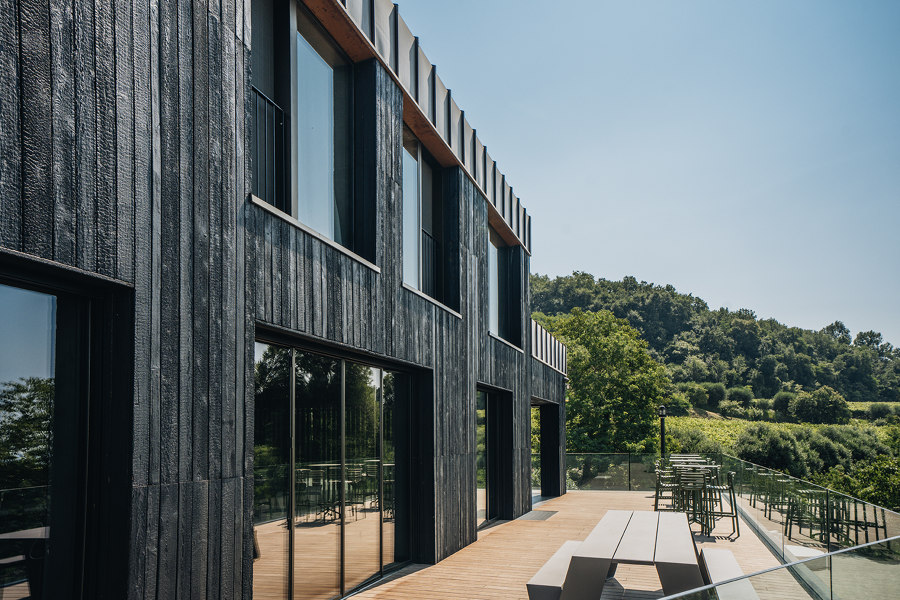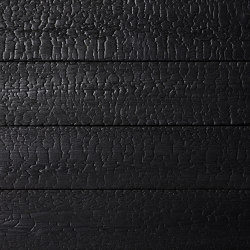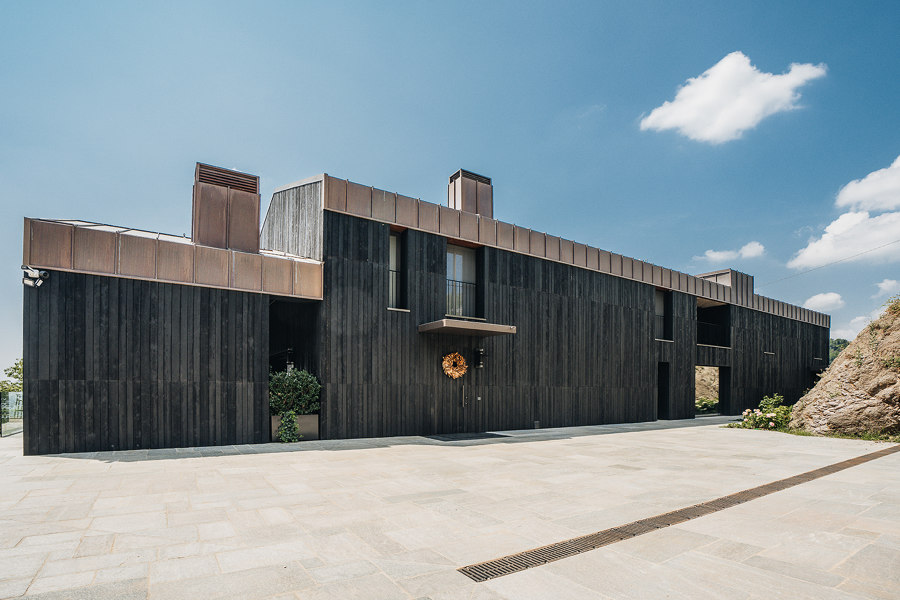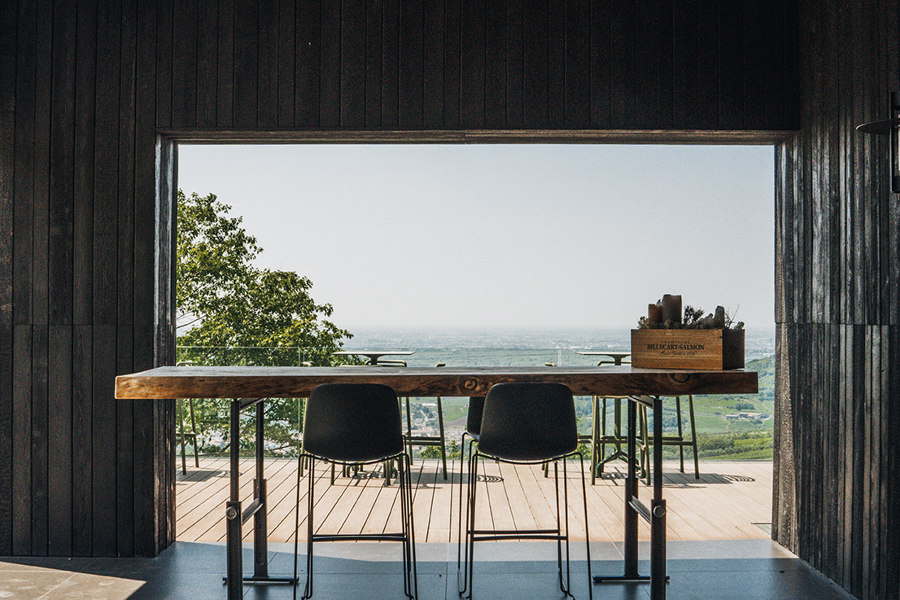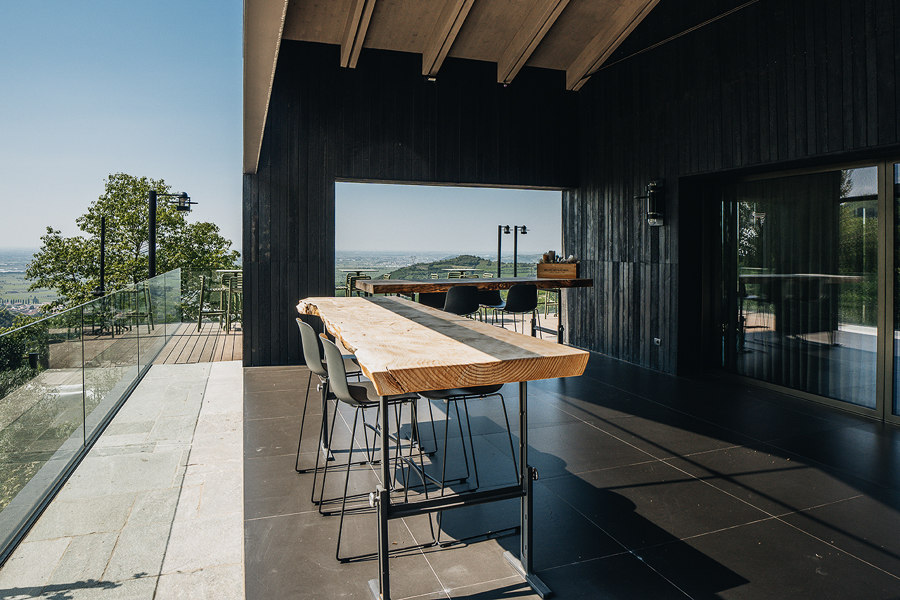Reviving tradition with high-tech planks: Sapiens' journey from Japan to Italy
Storia del Marchio di Harriet Thorpe
Fenegrò CO, Italia
27.11.24
An innovative HI-TECH technique, inspired by a traditional Japanese method, enables Sapiens to create sustainable, durable wooden planks with striking aesthetics for projects like Volcanalia.
Sapiens’ ARDES DRY Plank Hi-tech Black, inspired by the traditional Japanese Shou Sugi Ban technique, completes Italian winery Volcanalia, designed by ASA Studio
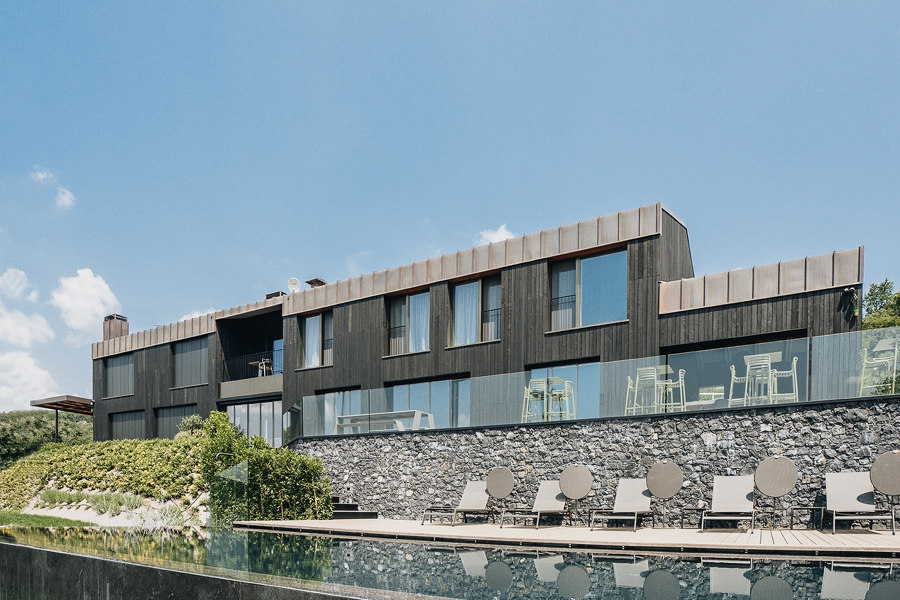
Sapiens’ ARDES DRY Plank Hi-tech Black, inspired by the traditional Japanese Shou Sugi Ban technique, completes Italian winery Volcanalia, designed by ASA Studio
×The ancient Japanese Shou Sugi Ban technique involves charring the surface of wood to form a carbonised seal; a durable, waterproof finish with a silky texture and dense black colour. Its useful properties and striking aesthetic have been used in architecture and interiors across the world, attracting many admirers. The process is an age-old example of humans working consciously in collaboration with nature, harmonising innovation and technology alongside sustainability.
This natural, sustainable cladding enables Volcanalia to blend seamlessly with its volcanic surroundings, enhancing its connection to the landscape
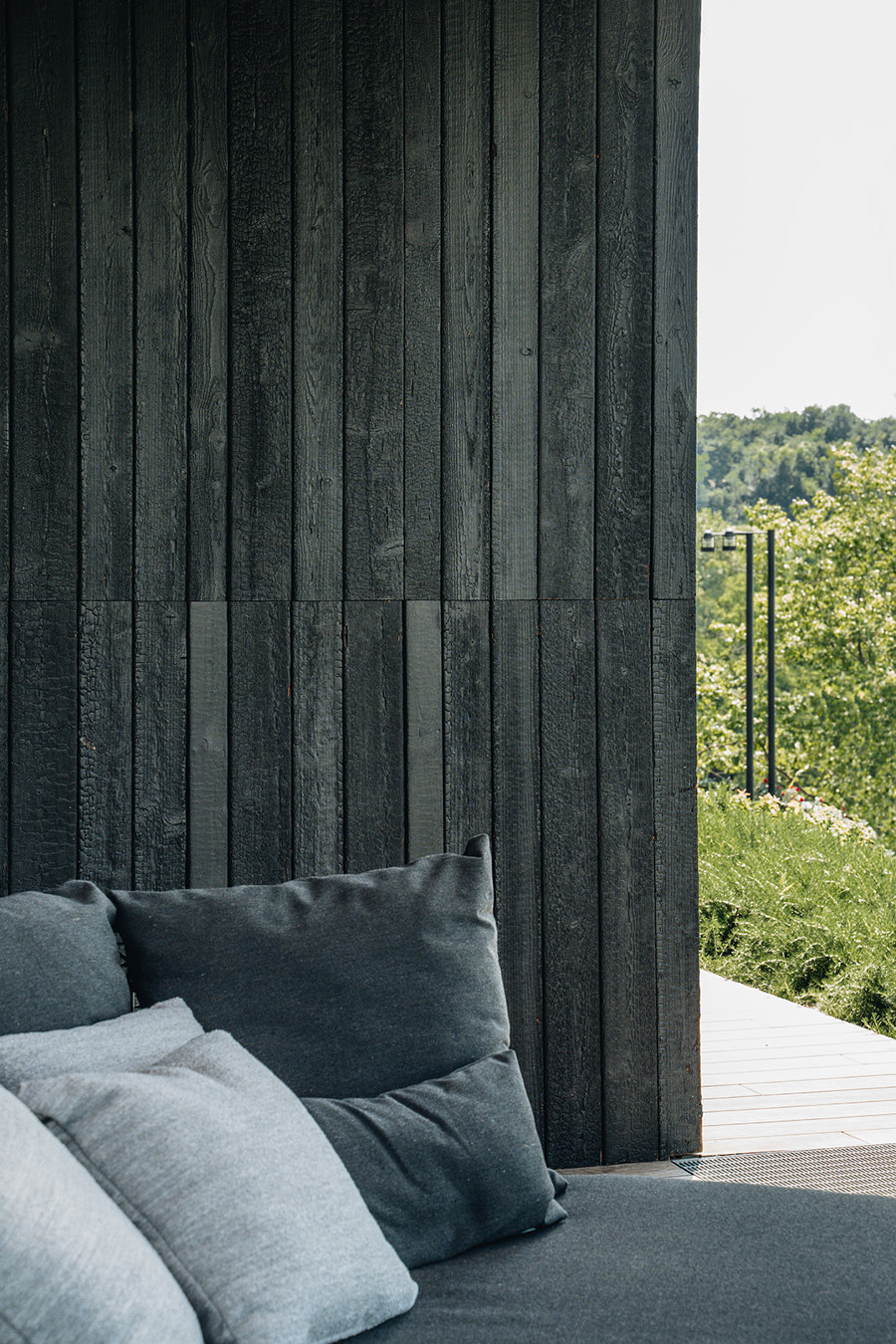
This natural, sustainable cladding enables Volcanalia to blend seamlessly with its volcanic surroundings, enhancing its connection to the landscape
×Organic aesthetics
The power and beauty of the effect can be seen at a winery and guest house named Volcanalia on the wine road in Gambellara, an agricultural area in the volcanic hills of Vicenza, Italy. In recognition of the historic, harmonious relationship with land, architects at ASA Studio, led by Flavio Albanese, were searching for a natural and sustainable exterior cladding material that could strike up a conversation with the basaltic hills whilst also defining its own dynamic and contemporary identity. They were interested in the Shou Sugi Ban technique, yet as a hospitality project, the requirements for tough durability, low maintenance and enduring elegance for a high quality visitor experience were key.
‘Historically in Italy, wood hasn’t been used extensively in buildings, yet this is changing thanks to the growing respect for the environment’
During their search for the perfect material, the architects discovered Italian manufacturer Sapiens’ flagship interior and architectural wood product, the ARDES DRY Plank Hi-tech, which takes direct inspiration from the Shou Sugi Ban method and when specified in Black is authentically evocative of the traditional technique. Yet these advanced wood panel boards have added advantages. The sustainably-sourced resinous European wood is first treated with fire, then, a revolutionary international patent involving water-based nanotechnology is applied to strengthen the integral, intelligent properties of the material – enhancing its resistance and durability, improving the longevity of the organic textures, tone and colours – all whilst preserving its participation in the circular economy.
The European wood is treated with fire and enhanced using water-based nanotechnology, creating the durable ARDES DRY Plank Hi-tech material
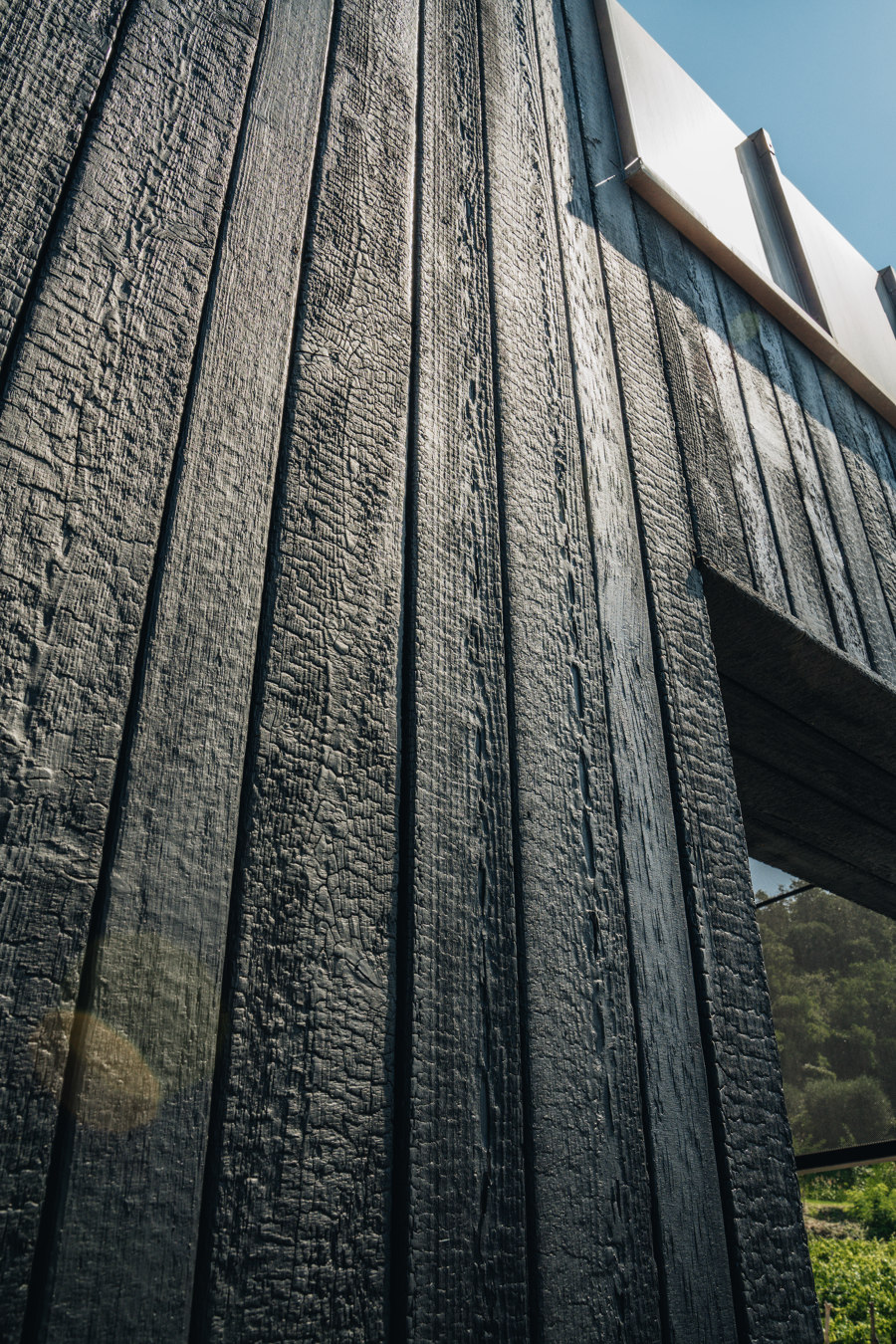
The European wood is treated with fire and enhanced using water-based nanotechnology, creating the durable ARDES DRY Plank Hi-tech material
×Ethical construction
Not only does the ARDES DRY Plank Hi-tech strengthen the qualities of Shou Sugi Ban, it also importantly eliminates its negative attributes: it allows for more compact slats, which have no soot release and can be used indoors. It’s a product that opens up new possibilities for architects and designers, as well as through its selection of colours in addition to the popular black option, from metal, to reclaimed wood, Corten, and other rich and enigmatic natural tones, offering a reassuring aesthetic control. ‘At Sapiens we promote the use of sustainable raw materials such as wood by creating products that are strengthened with technological innovation, making them even more practical to use,’ says the Sapiens team.
‘At Sapiens we promote the use of sustainable raw materials such as wood by creating products that are strengthened with technological innovation’
The ARDES DRY Plank Hi-tech in Black therefore provided the best solution for Volcanalia, maintaining the captivating appeal of Shou Sugi Ban, while solving the technical requirements. Custom length planks were positioned in three parallel bands to create a poetic design combined with an oxidised copper roof: ‘Its texture does not resemble a rural wood with a classic grain, but expresses the force impressed by fire on the planks’ says the Sapiens team. ‘Historically in Italy, wood hasn’t been used extensively in buildings, yet this is changing thanks to the growing respect for the environment. There are still challenges to overcome, for example, many believe that wood requires more maintenance, yet our team is working to educate architects about the technical characteristics of innovative natural materials such as ARDES DRY Plank Hi-tech.’
Sapiens’ ARDES DRY Plank Hi-tech is ideal for Volcanalia, offering durability, waterproofing, sustainability and soot-free performance for both indoor and outdoor use
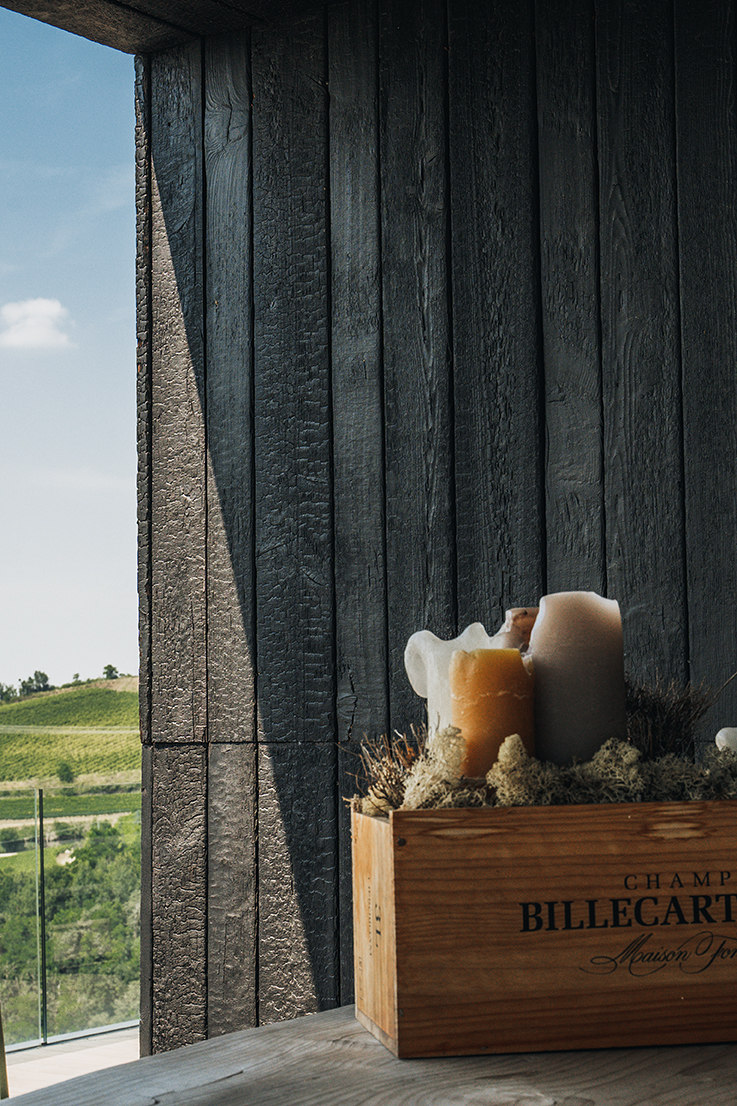
Sapiens’ ARDES DRY Plank Hi-tech is ideal for Volcanalia, offering durability, waterproofing, sustainability and soot-free performance for both indoor and outdoor use
×Sapiens’ philosophy of blending raw organic beauty with high functionality is ultimately rooted in the protection and wellbeing of the planet and humanity. The expert team at Sapiens enjoys collaborating with like minded architects and designers who are both open-minded and sensitive to this mission, ready to help identify, adapt and customise products to better enhance wellbeing and celebrate genius loci. Sapiens believes that today, a conscious and reciprocal relationship between industry and nature is paramount.
© Architonic
Head to the Architonic Magazine for more insights on the latest products, trends and practices in architecture and design.


